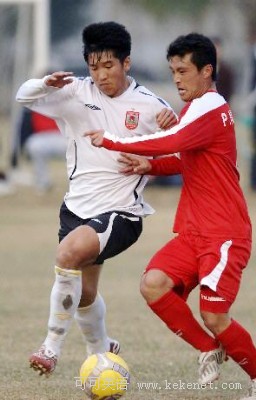
Few Chinese children are playing soccer. Some sports journalists and fans attribute the lack of interest partly to schools de-emphasizing sports in general and the lack of playing venues in the country's dense urban areas. "What can Chinese kids do?” said Fan Huiming, 61, a Chinese soccer fan who grew up watching matches at Beijing's Workers' Stadium, which was built in 1958 near his childhood home. "If they play soccer, the ball may fly directly into the glass of someone's home."
很少中國孩子踢足球,一些記者和球迷認(rèn)為,這在一定程度上是由于學(xué)校普遍不重視體育所致,另外則與中國的密集城區(qū)缺少足球場有關(guān)。“孩子們能做什么呢?”自幼就在北京工人體育場看比賽的61歲球迷范惠明(音)說,“如果他們踢球,球可能直接飛到別人家玻璃上去了”。
For young people, soccer has largely been eclipsed by basketball, thanks in part to Chinese NBA players who are treated like rock stars. Journalists and fans say NBA's aggressive campaign of marketing and merchandise in China has helped swell the popularity of basketball. By comparison, they noted that international soccer does not even have an office in China。
對中國年輕人而言,足球與籃球相比黯然失色。在NBA打球的中國球員被像搖滾明星一樣追捧。記者和球迷表示NBA大力拓展中國市場提高了籃球普及率。相比之下,國際足聯(lián)在中國甚至沒有一個辦事處。
Rowan Simons, a Briton who came to China more than two decades ago and discovered he wasn't able to play weekend soccer, has been on a campaign to popularize the sport here. Simons said the main problem is that soccer elsewhere has traditionally started as a series of neighborhood clubs, but in China, "there's virtually no football at community level"。
20多年前來到中國的英國人西蒙斯,發(fā)現(xiàn)在周末都不能踢球后,就一直在中國致力于普及足球運動。他認(rèn)為主要問題是其他國家傳統(tǒng)上都從社區(qū)俱樂部做起,“而在中國,實際上并沒有社區(qū)基礎(chǔ)足球。”
"Football in China can only succeed if it's a grass-roots activity organized by the people," he said。
西蒙斯說,“只有民眾組織起草根活動后,中國足球才能夠成功”。













